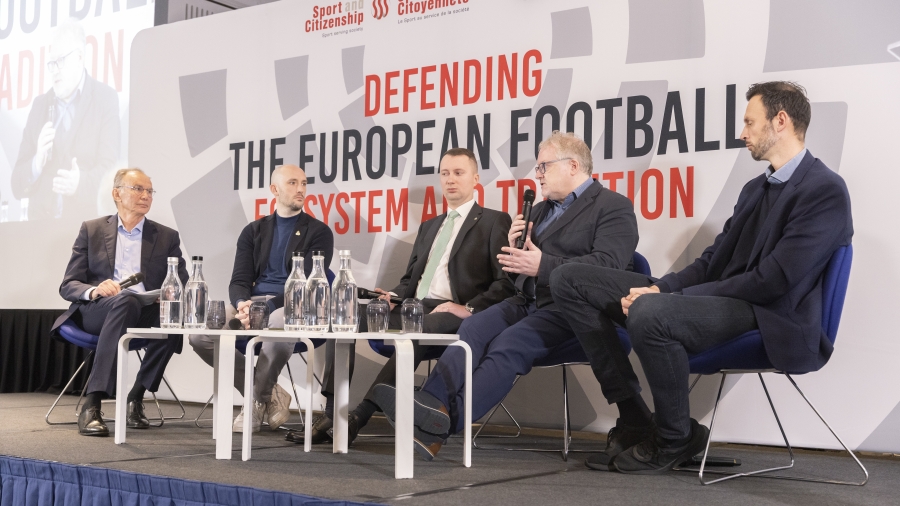
- Organisations, entities, clubs, journalists and other leading profiles in the sports industry met in Brussels to reiterate their support for the current football model and warn against the threat of the Super League.
- LaLiga president Javier Tebas stressed that "we must demand of European legislators that everything they have said in defence of the European sports model is translated into directives.”
The Renaissance Hotel in Brussels hosted the 'Defending the ecosystem and tradition of European football' meeting organised by Sport and Citizenship and LaLiga last week, an event which focused on the European football ecosystem and the sporting model needed in Europe to stand up to the threat of the Super League.
The event, which was attended by a host of organisations, entities, clubs, journalists, and other leading figures, began with a presentation by Tomasz Frankowski, Member of the European Parliament, who laid out his stance against the Super League as both a former professional footballer and parliamentarian.
“I consider the European Super League to be a direct threat to the European football pyramid, because if we allow an elite to break away from the rest, the whole pyramid and system will collapse,” said Frankowski. “We would be left with a commercial entertainment and profit-driven model in men’s elite club football. This is not what we want.
“The reasons have been made clear so many times. By all of the EU institutions, and more importantly by fans, leagues, national associations, players, and coaches. Our joint conclusions are clear: the organisation of sport in Europe is based on solidarity and redistribution, with open competitions and sporting merit,” he added.
Economic and legal impact of a breakaway competition
Following this introduction, Jean-François Brocard, Associate Professor and economist at the Centre for Law and Economics of Sport (CDES, University of Limoges), Tsjalle van der Burg, Sports Economist at University of Twente and Marc Watson, Group CEO and Co-founder of Eleven Sports, outlined the economic and legal impact of a breakaway competition.
The three experts explained the implications that a breakaway initiative such as the European Super League could have for national associations, domestic leagues, clubs, players, fans and broadcasters.
Jean-François Brocard said: “Institutions in the room know that if they want to be defended by the judges here in Brussels and Luxembourg, they need to do more to prove that they believe in this model, in the principles of this model; solidarity and integrity. The European sports model has its limits, but still, I think that it is a good base and all the alternatives to this model are worse.”
Tsjalle van der Burg, meanwhile, said that “the business model of the Super League is to strengthen those with most power in each country and is basically anti-competitive by nature. They want to gain market power in their own countries. They will say to the judges that they will distribute money at a grassroots level, but this will be a relatively small amount. If you restore the competitive balance in the leagues and lay out a clear distribution of money, it works much better.”
Finally, Marc Watson, Group CEO and Co-Founder of Eleven Sports, said: “There isn’t some great pot of money that is sitting there in the market, waiting to be allocated to a new format that happens to come along. If a new compelling format comes into the market, we will look into it. If a media company decides to buy it and allocate revenues to it, that has a very binary effects, it means less money for other sports properties. So, if one property is taking money out of the market, others will get less and in this case that means that the current ecosystem of leagues and federations and clubs, would in this scenario, get less.
“The Super League wouldn’t create an exponential amount of new money coming into the market, because, although it is not perfect, the current ecosystem is quite effective and consumers like it.”
Importance of the current model for football
Football officials from Belgium and the Czech Republic then took centre stage to discuss the ‘Importance of the current football model.’
Alex Musio, president of Union Saint Gilloise – an icon of Belgian football tradition – of the Jupiler Pro League and who took on the role in 2018 when the club was playing in the second tier, said: “One of the big hopes when we arrived was the European competitions. Without this motivation and without this meritocratic pyramid, our promotion would not have been possible. The fact that everyone has a chance represents everything for European football: it is the dream of every fan. Any factor that could change that is not logical.”
Czech side FK Jablonec’s vice-president Jaroslav Doležal also made his thoughts clear on the issues at hand. Founded in 1945, the club has been playing in the Fortuna Liga - the Czech top flight - for 30 years and last season featured in the UEFA Conference League. “Participating in European competitions boosts our annual budget by 8%. But it's not only because of the money, it’s also the attractiveness for sponsors and players, because of the transfers,” said Doležal. "It is always a pleasant surprise when a small club reaches the top level. That's why solidarity and fair distribution should move more in favour of the smaller clubs. Not just having the big piece of the pie for the big ones, but also improving accessibility and helping to reduce the gap.”
Stuart Dykes, a board member of Football Supporters Europe – the only fans' representative body in Europe and which includes the most important fan organisations from 15 European countries – said: “We have a quality model, the European sport model, which is not perfect. We have a lot of work to do to reform the existing system. But as far as we are concerned, we are not dealing with it now because there exists a big threat. Among our members we do not know of any organization or any serious representative of the fans that even considers the idea of a Super League. Nobody is in favour of it. The football family has come together as one and we unanimously reject the Super League."
Tomas Van Den Spiegel, president of the ULEB (Union of European Basketball Leagues), provided another perspective on the current European model of sport, given that basketball has already experienced its own breakaway issues in recent years, similar to those currently emerging in the football industry. “We know what a totally closed league is like, the EuroLeague has been like that for years,” he said. “It is controlled by eleven of the biggest clubs in Europe, who earn 70% of all revenues. We have lost national broadcasting rights, revenue, sponsorship. We need this to stop. We need to go back to the integrated model, because the EuroLeague is killing basketball at European level and it's not going anywhere. It's a very harsh conclusion but it's true, we need this to stop. This is not working. This is not the way forward.”
“They want to steal the money that the clubs have”
To cap off the event, LaLiga president, Javier Tebas shared a series of key messages supporting the current European sports model and highlighting why the Super League is neither a realistic nor practical option for the future.
“What will happen on 15th March? It seems 15th March will end the debate ongoing in European football. This is my opinion, and I hope that the ruling of the court of justice will agree. But regardless of the ruling, we need to demand of our European legislators and the European Commission that they defend European football, and the 100,000 families making a living from it. We must do this regardless of the ruling,” he said.
“The Super League is an attack on the domestic and national leagues; they say it isn’t because they know we would be more against it if they did. The Super League would destroy domestic leagues. We have to think that European football has 1,500 professional football clubs, over 50,000 footballers. There are thousands of families that live from football, so this is dangerous. It endangers the ecosystem, and we have to think about this very carefully. LaLiga studied it in depth with KPMG. What they want is to distribute the majority of revenue amongst themselves but now they are asking to talk. In 2021 they weren’t prepared to do so but now they want to because it didn’t go well. Everything needs to be led by UEFA,” he added.
The LaLiga president was steadfast in his warnings about the Super League. “If they come to rob my house and I see them, and I’ll kick them out with whatever I can,” he said. “This is what we must do now. They want to steal the money from clubs in our own homes. You have to be polite but staying silent or politically correct isn’t an option. They want to rob us in our own homes.”
